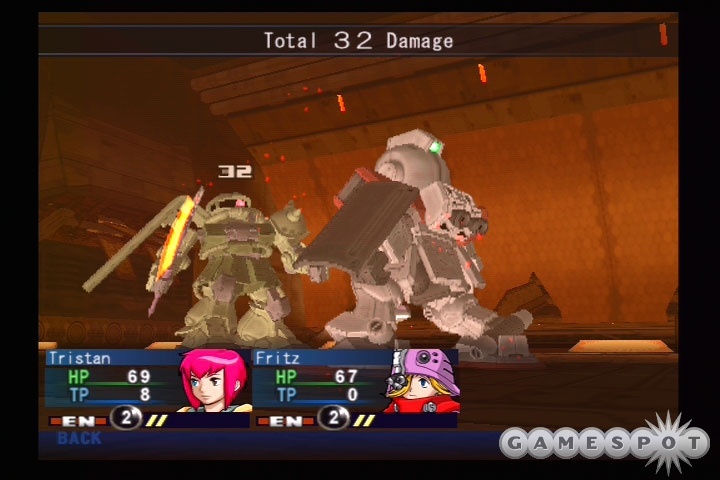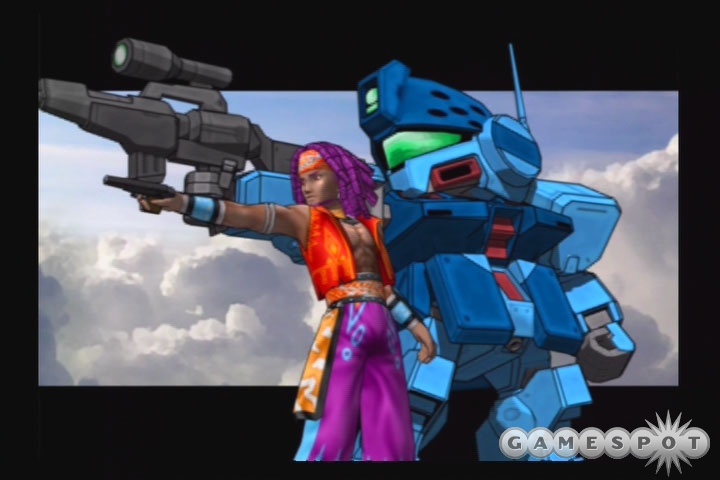To the uninformed, the abbreviation in the title of MS Saga: A New Dawn could mean any number of things. Mustard Stain. Mussel Soup. Muddy Socks. But as interesting as those may sound, they're all wrong. The MS in this title stands for Mobile Suit, and in case you don't know, mobile suits are the lumbering, mechanized stars of the immutable Gundam anime series. MS Saga is the latest from the Gundam gurus at Bandai, and even though it's an original role-playing game rather than an action game based on a specific anime series, it's still very much a Gundam game. That means you can collect and customize dozens of mobile suits within the context of a fairly generic story that builds upon a foundation of unambitious game design and limited production values. But as dated as the game looks and feels, it has enough charm and challenge to appeal even to those who are uninitiated in the ways of the Gundam.
The story takes place in a retro-futuristic version of Earth several years after The Great Fall, which was a cataclysmic event involving a massive energy surge that brought mankind to the brink of destruction. Prior to the fall, mobile suits were common, but they were left behind as mankind regrouped after the catastrophe. We pick up the story years later, when an orphanage is suddenly attacked by mysterious mobile suits with unknown motives. The orphanage is destroyed, and the only survivors are an effeminate teenage boy named Tristan and his close friend, Fritz. With the help of a well-connected acquaintance the two boys manage to procure mobile suits of their own and subsequently set out to avenge their fallen friends. As they search for answers they discover that the evil Dark Alliance is responsible for the attack on the orphanage, as well as a host of other unprovoked attacks on cities throughout the world. The two boys meet a handful of companions along the way, and together they set out to (guess what) save the world from the clutches of evil.
MS Saga plays like a very basic RPG and as such it relies heavily on genre conventions like random encounters, experience points, dungeon-crawling, and treasure hunting. The story progresses in a series of missions and fetch quests that take you all over the world from one hostile area to another. While exploring towns you take control of Tristan, but whenever you're in a dungeon or on the world map you move around in a mobile suit. When traveling through contested areas, you'll frequently get dragged into battle--so often, in fact, that it often drags down the pace of the game. It also doesn't help that the dungeon and mission designs often require a lot of backtracking. The game also has a bad habit of building challenge by throwing tons of enemies at you in quick succession, testing your endurance (and patience) more than your battle strategy. Several dungeons require you to simply clear a certain number of battles, although there are occasional bosses to contend with as well.
Battles play out in standard turn-based RPG fashion. You can have up to six people in your party, but only three can participate at any one time. Before each turn, you assign actions to each active member of your party and then the action plays out based on initiative. Your primary attacks are either ranged or melee. Ranged attacks are weaker, but safer because there's no threat of counterattack. Melee attacks, on the other hand, inflict more damage but leave you open to counterattacks. Each character also has unique techniques available, which work like magic spells and can be used to repair damaged mobile suits, inflict status effects, and perform special attacks.
Boost attacks are powerful special moves that require energy points to use. In fact, every action you perform in battle uses at least one energy point. You regenerate energy points each turn, though, so you can quickly build up an energy surplus if you stick to relatively simple actions. That surplus can then be used to perform powerful boost attacks. These attacks vary depending on the character. There's a standard boost attack that simply inflicts heavy melee damage; there's a counterzone boost attack that makes one mobile suit absorb all melee attacks, thus protecting the rest of the party; there's a shoot-all attack that inflicts damage on all enemies; and more.
You can switch your characters during battle as well, so if one of your mobile suits is about to be destroyed you can bring a different mobile suit in to take over. Mobile suits that aren't active in battle gain energy and health each turn, which is helpful for protracted boss battles.
Each character will earn experience from every battle you win, regardless of whether or not the character actually participated in the battle. But while your characters level up automatically, the mobile suits have to be upgraded manually. When in a town you can visit a vendor who will upgrade your mobile suits for a price. You can upgrade each mobile suit to improve attack, defense, and speed. You can also change out each of the parts on your mobile suit, from arms and legs to shields and accessories. There are more than 250 different parts in the game, so there are plenty of ways to customize each of your suits. There are also more than 30 basic mobile-suit types, which you can create by collecting data and visiting one of several G-system locations in the game. Each mobile suit has unique stats and equipment capacity, which determines the number and type of weapons and items you can equip.
It's fun to collect and customize mobile suits, and each configuration is unique enough to compel you to experiment with different combinations of suits, parts, and weapons. In most role-playing games, money becomes a nonissue because most of the best items are found rather than purchased. Here, money is actually useful because it's in short supply and it's required to upgrade your mobile suits. And you'll have to upgrade your suits, because the enemies in the game tend to be fairly tough and you'll quickly be outmatched if you haven't spent the time and money to bring your suits up to speed. The challenge is welcome, but at the same time, it can be frustrating because it requires you to frequently go back to the nearest town to upgrade your suits, which artificially lengthens the game and sets a tedious pace. The frequent encounters, backtracking, and tons of collectible parts and suits all add up to a lengthy adventure. You can easily spend 40 hours or more playing through the game.

The presentation in MS Saga is nothing to speak of, and the only defining characteristic is the chibi look the suits all have. The mobile suits are all squat and miniaturized compared to the traditional Gundam designs. There are attempts to establish a sense of scale, like the placement of tiny-looking trucks and buildings in certain areas, but for the most part the mobile suits just don't have an impressive presence. The suits do show plenty of detail, and you can adjust the color of each part, which gives you yet another way to customize your suits. The environments are all drab and empty, and mostly consist of military bases, nondescript caverns, and such. The character designs are generic and none of them are even slightly interesting or compelling. Don't expect to see any eye-popping cutscenes, either.
The sound is rather dated as well. There is some limited voice acting in the game, but it's so sporadic that it just feels out of place. The music is cheap and light, but on the upside, it's so unremarkable that you'll hardly notice it one way or another.
MS Saga is a bare-bones role-playing game that benefits from the same brand of extensive customization that has helped make the Gundam series so successful. The gameplay is simplistic and derivative, and the presentation is uninspired, but those looking for a new type of Gundam game will find a sometimes enjoyable experience in MS Saga.
